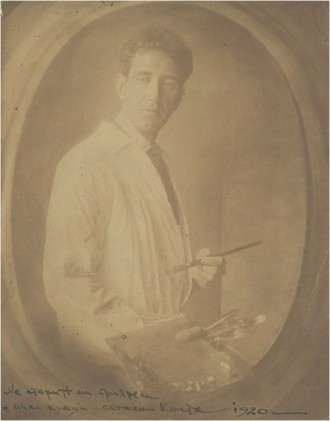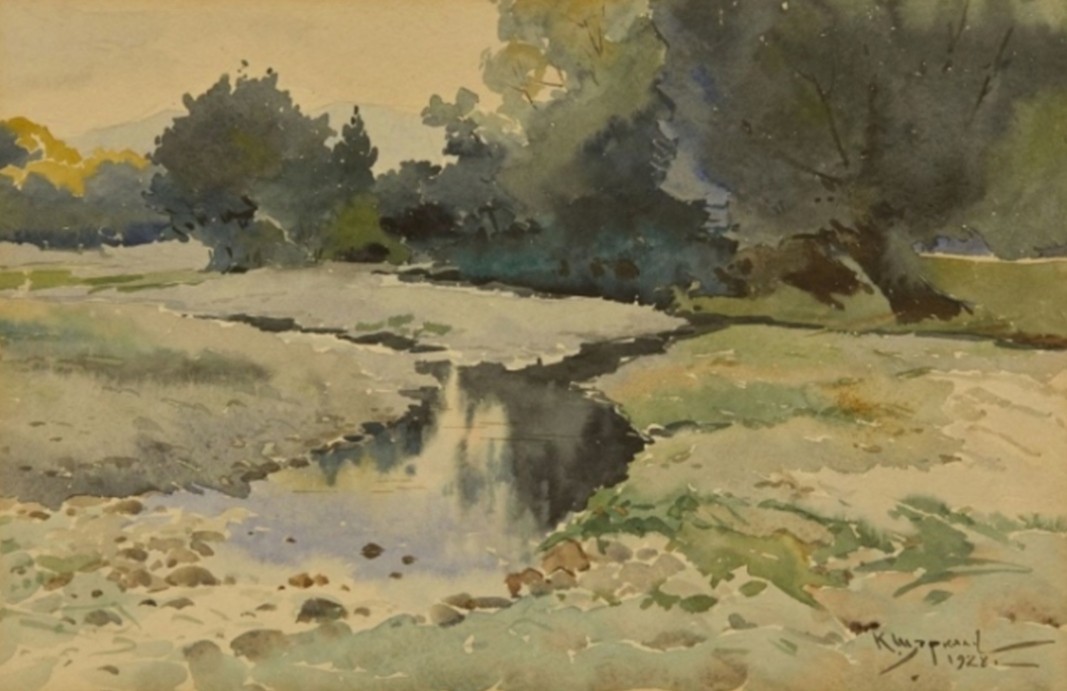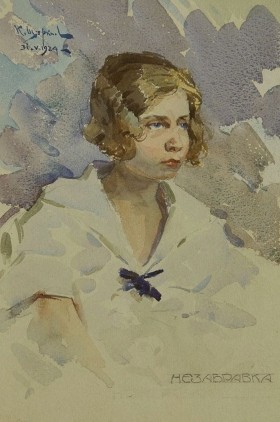Konstantin Shtarkelov paints the harshest of landscapes in the gentlest of ways, putting down on paper the most austere peak and the most modest brook in water colours just as they open up to his eyes, without ever feeling the temptation of correcting what God has created.
An exhibition postponed when pandemic time stopped throws a bridge between “before” and “now” as if in the knowledge that today we shall need, more than ever, the touch of his water colours on the finest strings of the soul. The Sofia City Art Gallery has opened its doors to celebrate the 130th birth anniversary of Konstantin Shtarkelov with an array of his works – landscapes, still lifes, portraits, war paintings.
 Literary critic Alexander Balabanov called Konstantin Shtarkelov the “king of water colour”, a sobriquet that was to stick for life.
Literary critic Alexander Balabanov called Konstantin Shtarkelov the “king of water colour”, a sobriquet that was to stick for life.
“He is the widow’s son, he is the poor artist,” says curator Adelina Fileva. “He is the lonely wanderer who loves to travel the country from end to end. His friend Grigor Vassilev says that if ever Bulgaria were to disappear we can reconstruct it by his works. The comforts of home or the studio were not for him, what he wanted was to experience all of the places he painted. The wars were a difficult time for him, but we see him as a person who loves life and making merry. He had many good friends, appreciated songs, good wine, poetry. He even wrote poems himself.”
Konstantin Shtarkelov was born in Sofia in 1889 to an artisan family. Having lost his father at an early age, when he was 18, Shtarkelov left for Odessa where he was a church singer and lived in a monastery. But his beggarly days were not something he complained about, he was glad of a piece of bread and a cup of hot tea. While in Russia he offered his first drawings and copies of famous paintings to book stores. Years later, he returned and started his studies at the Drawing School (as the National Academy of Art was then called), under renowned Bulgarian painter of Czech origin Prof. Ivan Mrkvička.
“What the artist learnt at the academy was good, but he had his travels,” adds Adelina Fileva. “Besides Russia he traveled extensively in Europe as far as Egypt where he specifically went to see the galleries and museums. And all of this – everything he learnt at the academy, from colleagues and friends, from European cultural hubs had its effect, making him more confident in his work and the choices he makes without taking heed of latest fads or tendencies in art.”

In 1911 Konstantin Shtarkelov turned the wardrobe of the Drawing School into a gallery, and there put on display, for the first time, almost 80 of his works. To his surprise Tsar Ferdinand bought 27 of them, and with the money the young artist took to traveling to broaden his artistic horizons. He fought in three wars, but even at the front his artistic eye made a study of God’s wondrous creations, neglecting the human atrocities.
 “Konstantin Shtarkelov made nature more human”, says Adelina Fileva. “And in nature he found the freedom and peace of mind to create more wide open spaces. To begin with they were his and his alone, he was their dweller before they reached the audiences. Even in the portraits he painted he remained more of an onlooker, standing on the edges as an artist.”
“Konstantin Shtarkelov made nature more human”, says Adelina Fileva. “And in nature he found the freedom and peace of mind to create more wide open spaces. To begin with they were his and his alone, he was their dweller before they reached the audiences. Even in the portraits he painted he remained more of an onlooker, standing on the edges as an artist.”
With his 10th exhibition in 1935 the now well-established painter celebrated 25 years as an artist, the last time his talent was acknowledged before his gift, his work and his integrity were wiped out by the new-fledged communist ignorance. In 1944 he was arrested for “connections with the royal family” and thrown in jail, he was deprived of his Sofia residence and was thrown out of the artists’ union. Though vindicated to a certain degree, his last exhibition in 1959 was vilified by the official press.
A little before his death, Konstantin Shtarkelov wrote to his friend, writer Chudomir: “To have remained true to yourself for 50 years, to have lived under all sorts of conditions and still to have persisted unbroken in art.”
Photos: Sofia City Art Gallery
A two-day festival of non-fiction books “Science, art and culture” is opening within the frameworks of the 51 st Sofia International Book Festival at the National Palace of Culture. Over the weekend, fans of history, art, cultural tourism and..
Plovdiv is hosting the annual festival for Bulgarian documentary and animation cinema ''Golden Rhyton'' which will last until December 19. The selection of movies is more than promising. More than 50 documentary and animated movies will compete in..
"In the book ‘Bulgaria I s M y S ong’ Iliya Lukov reveals himself to us as a great patriot who has done a lot for the Bulgarian spirit . " This is how Galin Georgiev, an ethnographer and one of the book's..
The latest Bulgarian film "Before I Forget" can be seen in cinemas from today. It depicts the sad reality of one of the most common modern diseases -..
The latest project by director Stefan Komandarev, "The Block Universe", is one of the 35 selected projects at the most important global forum for film..

+359 2 9336 661
